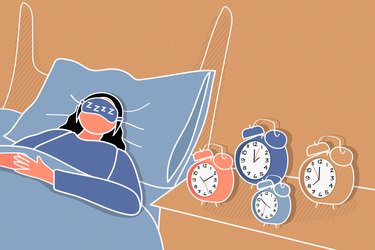
Sleeping is kind of like working out. Although both are crucial for good health, we often push them to the back burner or maybe even skip them altogether when life gets busy.
No one's workout routine is spotless, and nobody has a perfect sleep schedule 100 percent of the time. But inconsistent slumber — going to sleep at all different times or getting a different amount of shut-eye each night — likely affects your health more than you think.
Video of the Day
Just as you may prioritize your work or family time, your sleep deserves a little extra attention too. Read on to learn the effects of catching irregular zzzs.
Your Sleep Is on a Natural Clock
Your sleep schedule is controlled by your circadian rhythm, which is your body's natural 24-hour internal clock, according to the National Sleep Foundation. Various systems in your body are programmed by the circadian rhythm, but your sleep-wake cycle is one of the most important.
This cycle is pretty simple: When you wake up, sunlight causes your brain to send signals of alertness to the body, keeping you awake and active. At night, the darkness kickstarts your body's production of melatonin, a hormone that triggers sleepiness, promoting rest throughout the night.
But when your sleep is inconsistent, your circadian rhythm can get thrown out of whack, which affects the other systems of the body, explains sleep specialist Michael Breus, PhD, author of The Power of When.
"When you are in sync with your rhythm, your body functions optimally," Breus tells LIVESTRONG.com. "When you are out of sync, problems occur — and when you are out of sync for long periods of time, often, so does illness."
Jet lag, shift work and sleep disorders (including erratic sleep routines) can all cause a shift in your circadian rhythm, which can lead to the following problems.
Sleep Affects Your Immune System
People who consistently fail to get enough sleep each night (that's seven to nine hours for most adults) are at higher risk of getting sick when exposed to a virus, like the common cold, according to the Mayo Clinic.
When you restrict sleep or follow an unstable pattern, your body may also limit production of protective cytokines and antibodies, which help fight disease and infection.
Plus, inconsistent sleep can slow your body's recovery process, making it more difficult to heal, per the Mayo Clinic. Over longer periods of time, lack of sleep has even been associated with increased risk of obesity and cardiovascular disease (more on that below).
But it's not only the longer term that matters. Even just one night of poor sleep (four hours or less) can also cause your body to create inflammatory cytokines, protein molecules that promote inflammation, according to the National Institutes of Health (NIH). And inflammation has been linked to a host of health problems, which we'll get into next.
Related Reading
Sleep Is Connected to Gut Health
Your sleep schedule and gut microbiome are pretty closely related. The diversity and health of your microbiome not only affects your digestion, metabolism and immune system, but also your sleep patterns, according to a February 2019 study in Microorganisms.
That's because the bacteria in your gut also function according to a circadian rhythm, per the above-mentioned study. The circadian rhythm of your gut bacteria can actually shift the sleep-wake rhythm in your body, too.
This relationship works the other way around as well, which is why an erratic sleep schedule can harm your gut health, per the above-mentioned study. Misalignment between your circadian clocks can cause changes in the diversity of your gut bacteria.
Sleep disturbances have also been associated with gastrointestinal diseases, according to a December 2015 study in Gastroenterology and Hepatology. The inflammatory cytokines your body tends to release during sleep deprivation are also present with GI diseases like gastroesophageal reflux disease (GERD), inflammatory bowel disease and liver disorders, among others.
Related Reading
Sleep and Heart Health Are Linked, Too
If you want to keep your heart healthy and strong, sleep is a necessary piece of the puzzle. People who don't get enough sleep each night are actually at higher risk for cardiovascular disease, regardless of their age, weight or exercise and smoking habits, according to the National Sleep Foundation.
How exactly does sleep harm your heart? Irregular sleep patterns are linked to various cardiovascular risks, including obesity, high blood pressure, diabetes and coronary heart disease, according to Harvard Health Publishing.
As mentioned earlier, your body produces inflammatory proteins and stress hormones when you don't get enough sleep, which are risk factors in cardiovascular disease, per Harvard Health Publishing.
Obesity is another reason inconsistent sleep is often associated with heart disease.
Insufficient sleep has been linked to weight gain, according to Harvard Health Publishing. This may be due to the fact that your judgment is often impaired when you're tired. As a result, you may snack more or choose unhealthier, more calorie-dense foods. Fatigue may also make people feel more inclined to skip exercise.
Plus, insufficient sleep may affect hunger-regulating hormones. One older often-mentioned study found an association between short sleep duration and low levels of leptin, a hormone that helps you feel full, and high ghrelin (aka the hunger hormone), according to findings published in December 2004 in PLoS Med.
How to Establish a Consistent Sleep Schedule

Just like your workout schedule, creating — and sticking with — a nightly sleep routine is the best formula for success. By now, it's pretty clear a regular sleep schedule is crucial for your health, so make your evening practice a priority.
1. Stick to a Fixed Wakeup Time
First, set a wakeup time that gives you between seven to nine hours of sleep, recommends the National Sleep Foundation. Creating a sleep schedule is nearly impossible if you wake up at different times each day. So, rain or shine, weekend or weekday, set your alarm and stick to it.
2. Set a Bedtime Alarm, Too
Set an alarm for bedtime, recommends the Mayo Clinic. Just as you'd set your alarm in the morning, turn one on a half hour before you want to start prepping for bed. This may be tricky at first but, before long, will become as natural as your a.m. wake-up call.
Poor pre-bedtime habits are a big reason why many people struggle with insomnia and other sleep problems. While changing these habits can take some time and persistence, winding down at least 30 minutes before your bedtime is a great way to establish a restful mindset.
3. Create a Wind-Down Routine
Lower the lights and avoid phone, computer and TV screens, advises the National Sleep Foundation. Reading a book (yes, an actual book), listening to quiet music or running through some relaxing stretches can also help your body prep for bed.
Related Reading
So, How Bad Is It Really to Get Inconsistent Sleep?
It can't be said enough: You need to prioritize sleep. Your day-to-day sleep schedule affects your overall circadian rhythm, which can affect a multitude of systems in your body.
Getting inconsistent or too-little sleep can impair your immune system, gut health and heart health, hindering your body's ability to fight disease and keep inflammation at bay. Plus, you probably won't be able to think too sharply in a sleep-deprived state.
While hitting the hay at the same time each and every night may not sound too exciting, keeping your sleep regular is crucial. It may require some discipline, but following a consistent sleep schedule each day is one of the simplest ways to improve your health.
Related Reading
- National Sleep Foundation: "Circadian Rhythm"
- Mayo Clinic: "Lack of Sleep: Can it Make You Sick?"
- NIH: "NIOSH Training for Nurses on Shift Work and Long Work Hours"
- Gastroenterology and Hepatology: "Sleep Dysfunction and Gastrointestinal Diseases"
- National Sleep Foundation: "How Sleep Deprivation Affects Your Heart"
- Harvard Health Publishing: "A Good Night’s Sleep: Advice to Take to Heart"
- National Sleep Foundation: "Healthy Sleep Tips"
- Microorganisms: "Potential Role for the Gut Microbiota in Modulating Host Circadian Rhythms and Metabolic Health"
- Mayo Clinic: "Sleep: The Foundation for Healthy Habits"
- PLoS Med: "Short sleep duration is associated with reduced leptin, elevated ghrelin, and increased body mass index"
Is this an emergency? If you are experiencing serious medical symptoms, please see the National Library of Medicine’s list of signs you need emergency medical attention or call 911.
